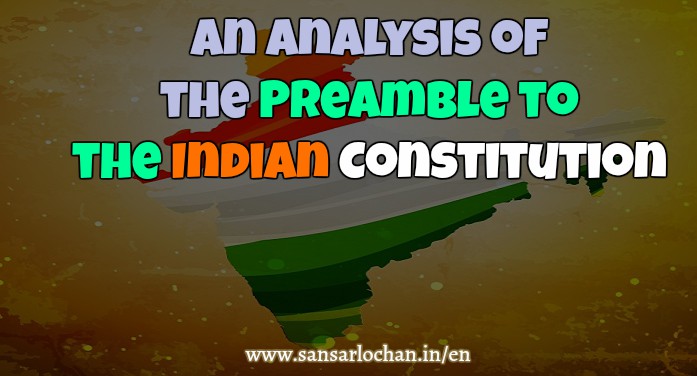The Preamble to the Indian Constitution is the starting point of the whole text of Constitution. It is an integral part of the same. It gives a glimpse of the process of thoughts which ran in the minds of the Constituent members. The Preamble proclaims that India shall be a democratic republic and its objectives shall be to ensure equality, fraternity and liberty for the masses. Below is presented a brief analysis of the words used in the Preamble.
Essence of the Preamble
- The Preamble is an invaluable introduction to the Constitution.
- The Preamble states that the people of India are the source of the Constitution.
- It also states that the people adopted, enacted and gave the Constitution to themselves on November 26, 1949, through their Constituent Assembly.
- It declares the people’s solemn resolve of two-fold objectives of constituting India into a Sovereign Democratic Republic.
- It secures its citizens Justice, Equality and Liberty and promoting Fraternity among them all.
The People of India
- The Preamble speaks of the unity of the nation in the context of promoting fraternity among the people of India. It is a nation with one will, one and voice.
- It means that sovereignty belongs to and is exercisable by the people as there is no room for Crown, Princes or any other rank.
- It implies that the people of India, as a body, were deemed to be present within the Assembly Chamber for framing the Constitution.
Solemn Resolution
The preamble recites the solemn resolution of the people and makes no reference to God. That this was deliberate is clear from the fact that an amendment moved by Kamath, to insert the words “In the name of God” in the Preamble, was put to vote and was lost by 41 to 68. This vote was essentially a vote for constituting India into a secular state. The Preamble aims at securing freedom not only of thought and expression but also of belief, faith and worship. The Fundamental Rights specifically guarantee religious rights, and the country has no state religion.
Sovereign Democratic Republic
The word “Sovereign” in the Preamble appears as an epithet of the noun “Republic” and conveys three ideas.
- The Republic of India as a single entity is sovereign. One country, one nation, one will, one voice and one state, this is the first idea the expression Sovereign Republic seeks to emphasise.
- The word “Sovereign” refers to the sovereign capacity of the Republic of India. India has sovereignty. She has independent and equal status with the other members of the international community and has supreme legal competence to give law to the country.
- It seeks to stress the fact of exclusive and final control of the Republic of India over its own affairs.
Democratic
As a political democracy India has responsible, representative government at national and State levels. It is a democracy based on universal adult suffrage, rotation in office and decision by a majority vote. The Directive Principles of State Policy specifically aim at economic democracy and a scanning of the various Entries in the three Lists of 7th Schedule also confirms the objective of economic democracy in the country.
Republic
Etymologically, Republic, a derivative from the Latin words res and publica, meaning public thing, has both wide and narrow connotations. In the widest sense a Republic refers to a state in which the supreme power resides in the body of the people. This means that people’s sovereignty, representative government and democracy all come within the ambit of Republic. A Republic has an elected head of the state. In India, not only the office of the head of the state, the President of India, is not hereditary but also it is to be filled in by election.
Justice, Social, Economic and Political
- Justice is a multi-dimensional concept of no definite connotation, and it is more commonly used than is readily defined. It may mean anything from justice according to law to righteousness and truth.
- From the word Social, the preamble means to convey the spirit of social justice.
- Economic justice obviously implies justice in economic matters. It has been interpreted to include economic activities in general and ownership and distribution of income, and wage-structure and pricing policies in particular.
- Political justice refers to the recognition of equal capacity of all citizens in political matters and stands against any arbitrary distinction between any two citizens in the political sphere.
Liberty
Liberty, the life-breath of all hitherto revolutions, aims at not only liberty from arbitrary restraint, but also at the securing of those conditions which are essential for the fullest development of human personality. The Preamble of the Constitution of India aims at liberty of thought, expression, belief, faith and worship. It has, thus, primarily the subjective aspect of liberty in view.
Equality
If justice may be said to be an exercise in harmony, equality is an essay on proportionality. It implies the existence of a basic minimum for all in social, economic and political matters, and then provision for equal opportunities for the development of one and all for the realization of their best selves.
Fraternity
The word “fraternity” means brotherhood. It is a feeling of oneness; oneness of existence, purpose and action. The Preamble aims at promoting fraternity among the people of India, assuring the dignity of the individual and the unity of the Nation.
